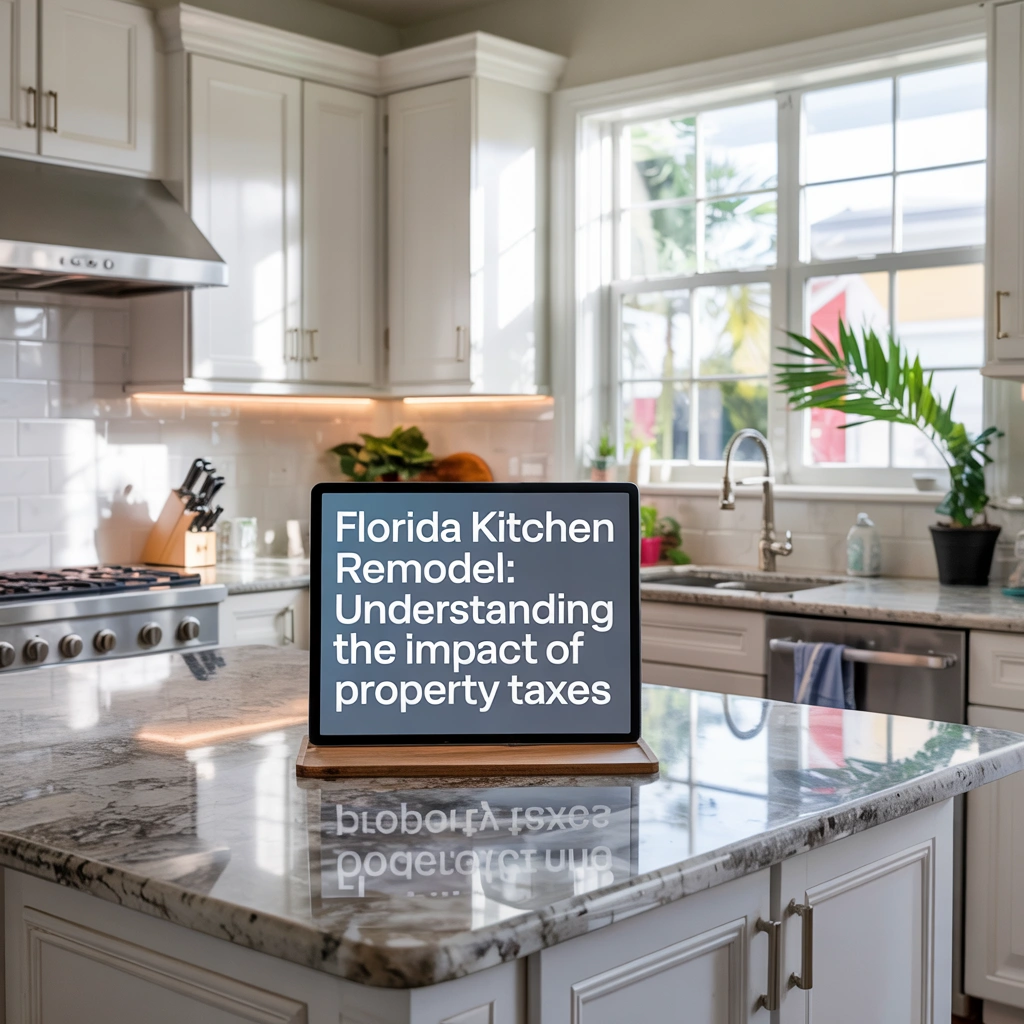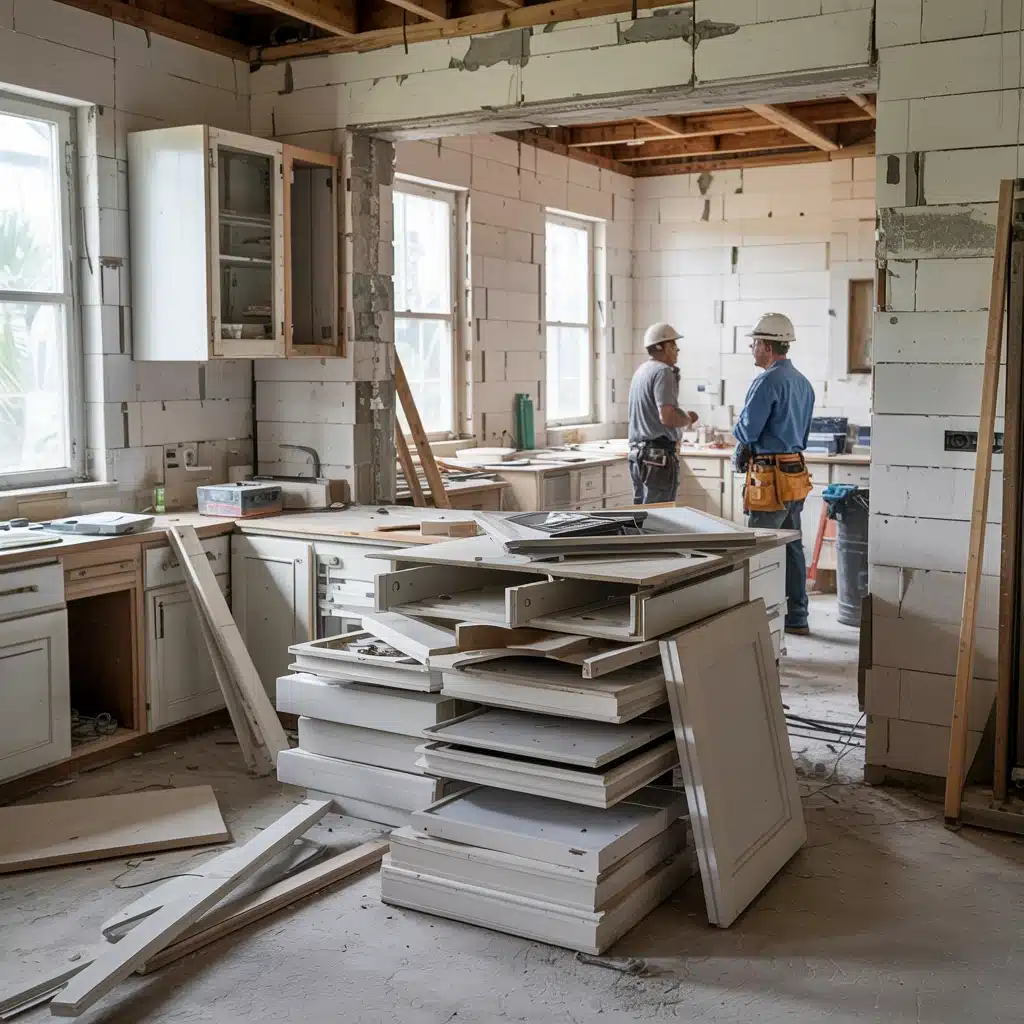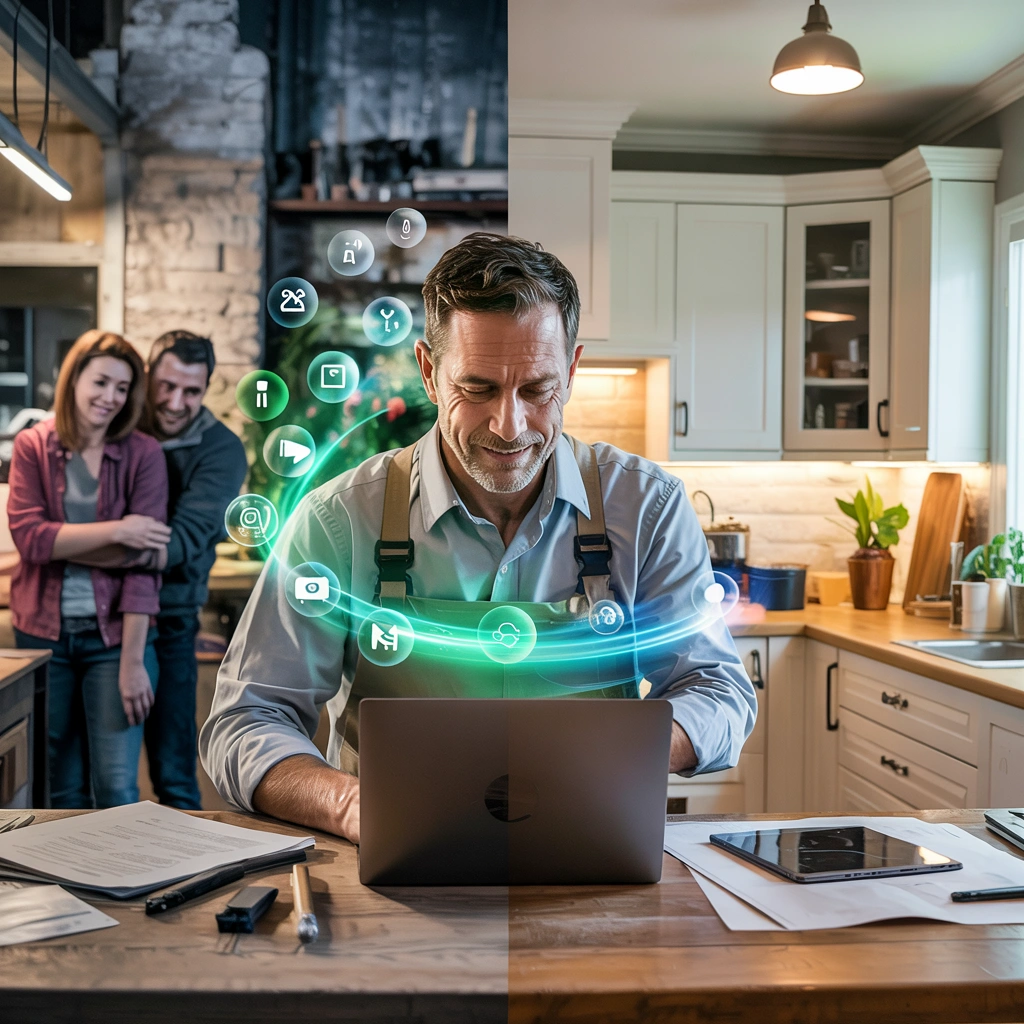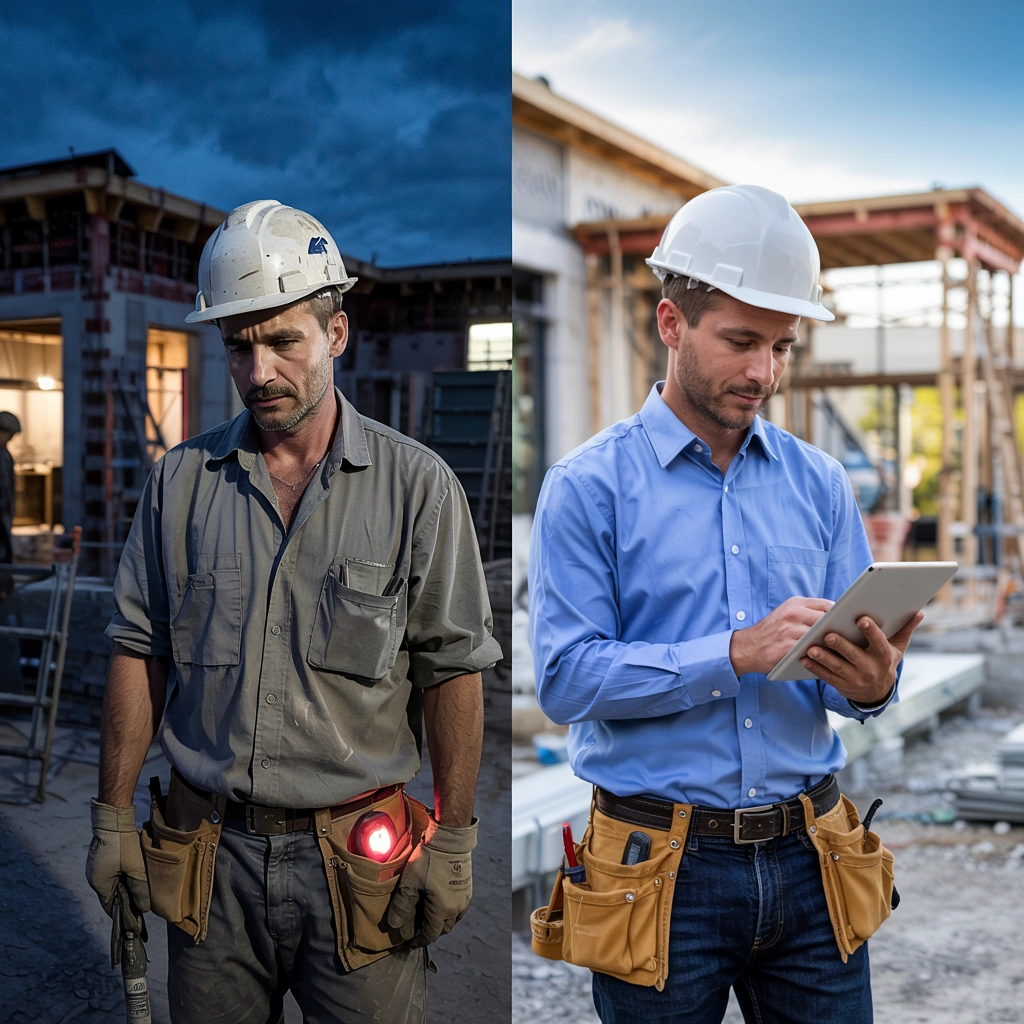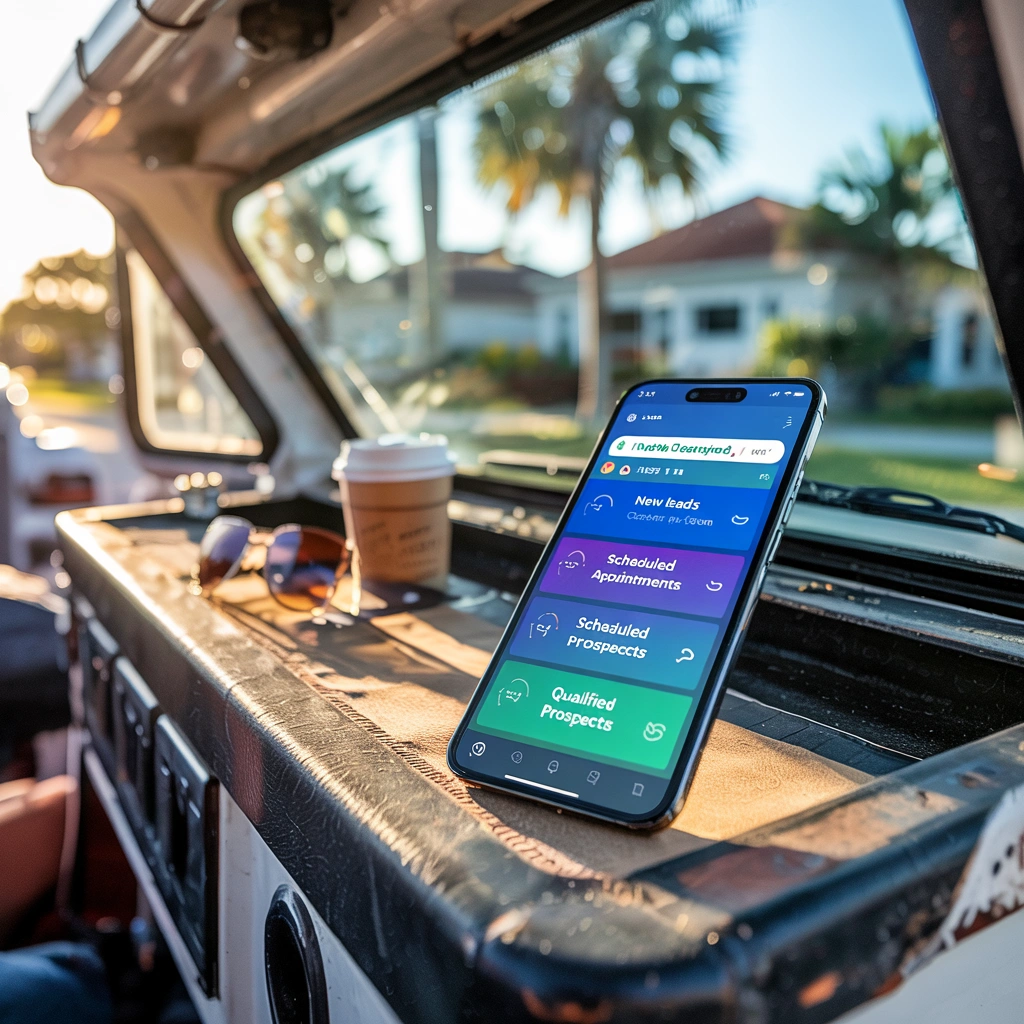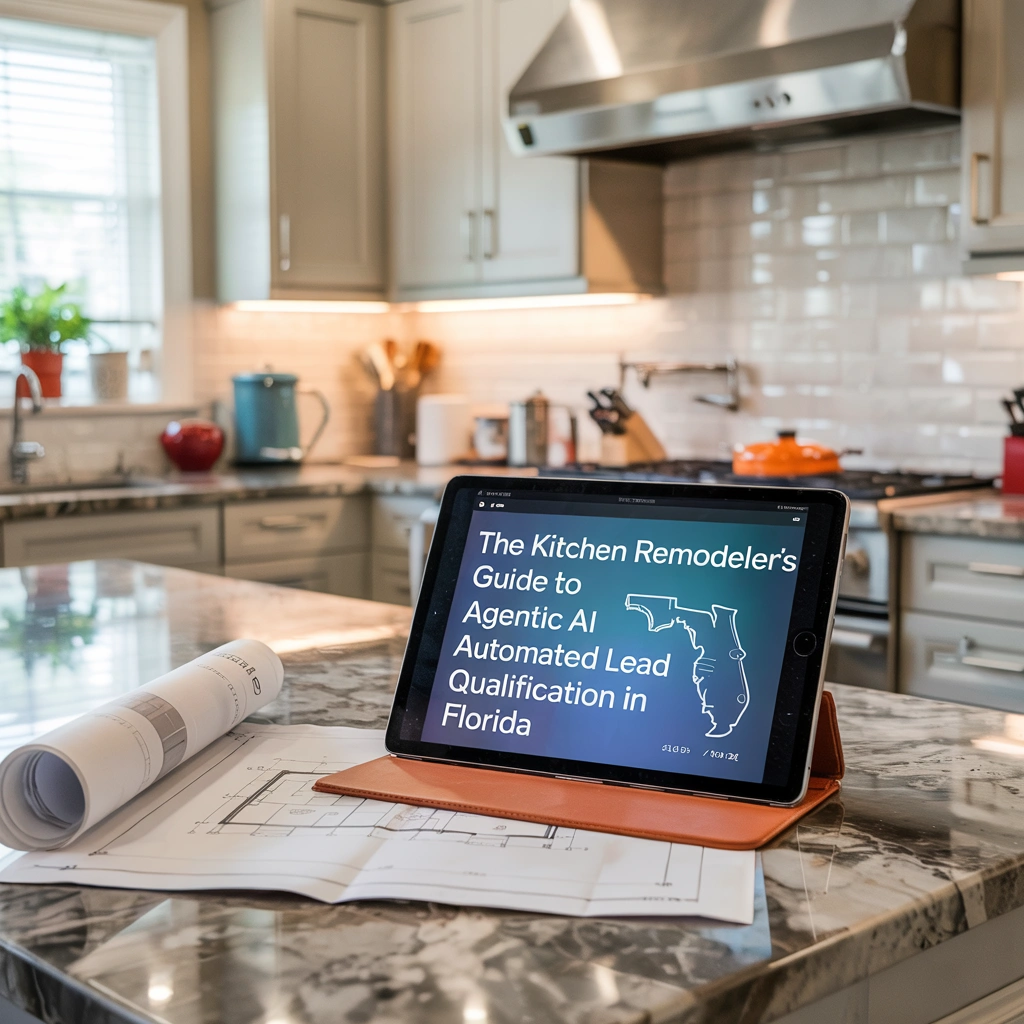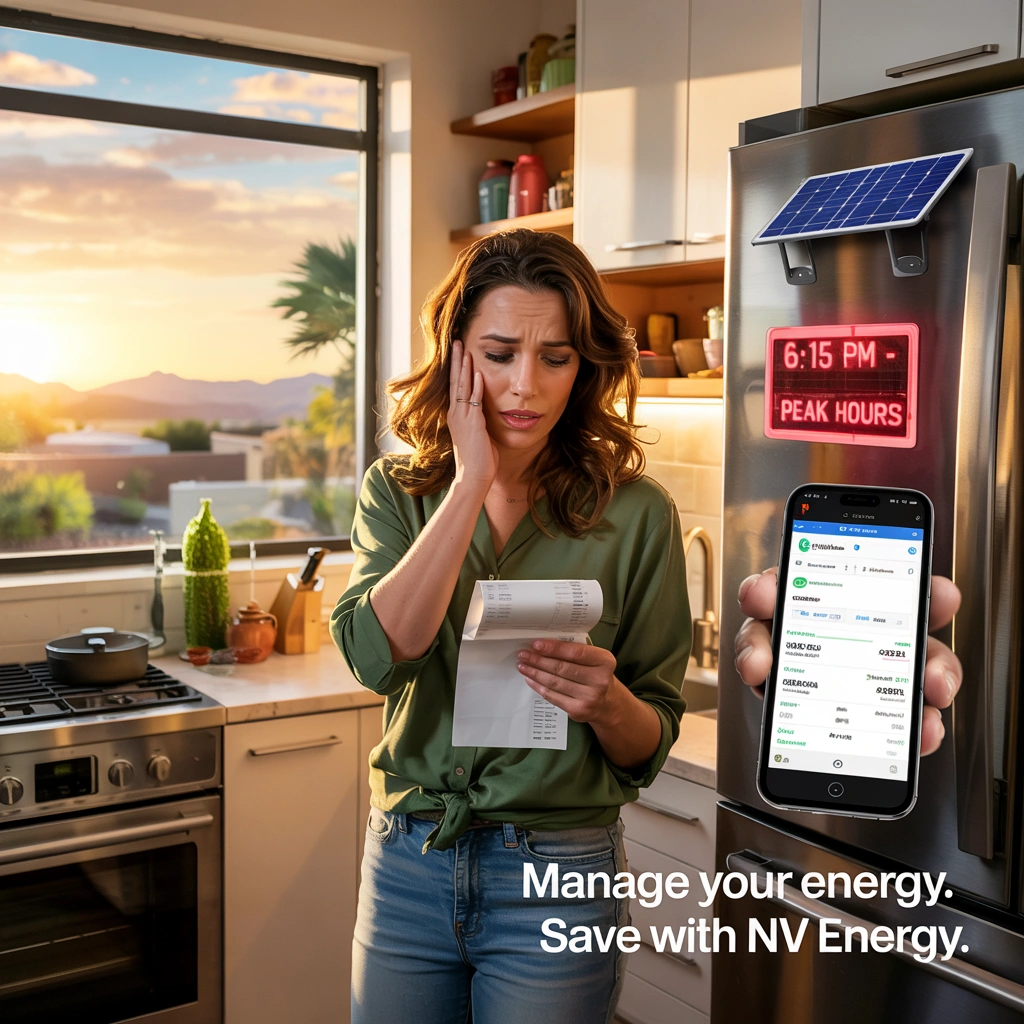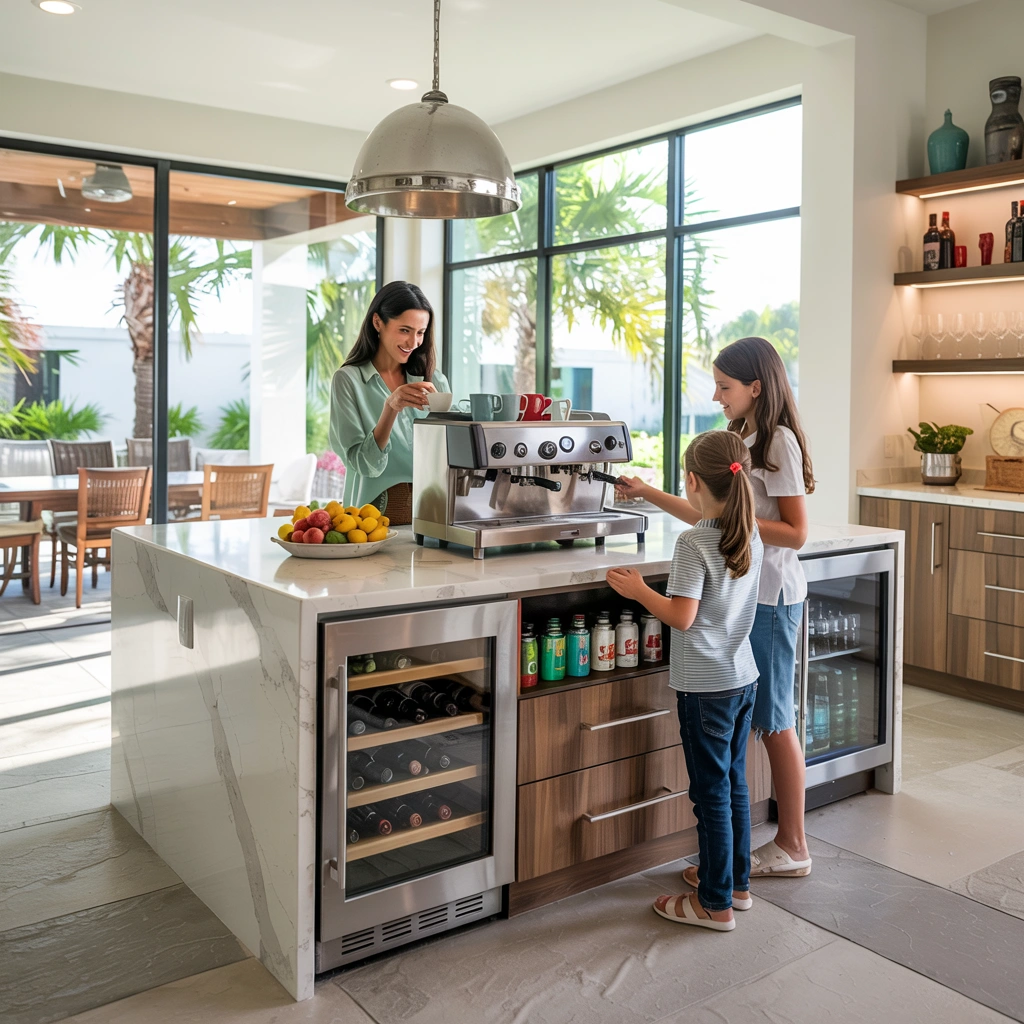
Summary: Looking to upgrade your kitchen? In Florida’s humid climate, a custom beverage station requires specialized materials like quartz countertops and marine-grade plywood. When properly designed with climate considerations, these stations can add 3-5% to your home’s value while protecting temperature-sensitive items.
Key Takeaways
- Custom beverage stations in Florida homes must address unique humidity challenges with proper material selection, like quartz countertops and marine-grade plywood.
- A well-designed beverage station can add 3-5% to your Florida home’s value when executed with climate considerations in mind.
- Temperature-controlled wine storage is necessary rather than optional in Florida’s climate to protect your collection.
- Proper placement away from cooking areas helps prevent heat exposure to temperature-sensitive items like wine and coffee beans.
- M&J Trusted Marketing specializes in helping South Florida homeowners design beverage stations that withstand the unique climate challenges.
Why Florida Homes Need Custom Beverage Stations: Humidity & Entertainment Challenges
Florida’s humidity levels hover between 60 and 80% year-round, creating unique challenges for kitchen design that northern homeowners never face. Remodeling contractors often encounter clients struggling with traditional kitchen layouts that fail to accommodate Florida’s unique climate and entertainment style.
The combination of high humidity, frequent entertaining, and indoor-outdoor living makes traditional kitchen layouts impractical for beverage service in Florida homes. When guests constantly move between pool areas and kitchen spaces, a dedicated beverage station prevents traffic jams around primary cooking areas while protecting temperature-sensitive items from Florida’s challenging environment.
Unlike northern states, where entertaining is seasonal, Florida homeowners host gatherings year-round. This constant entertainment schedule means beverage areas receive heavy use throughout all seasons. A thoughtfully designed station accommodates this lifestyle while addressing the practical challenges of serving drinks in a humid climate where ice melts faster and temperature fluctuations can damage wine collections.
Florida’s coastal environment adds another layer of complexity that standard kitchen designs don’t address. Salt air accelerates metal corrosion, making hardware selection crucial for long-term durability. The indoor-outdoor flow common in Florida homes means beverage stations must seamlessly integrate with both spaces while standing up to the environmental stresses that constantly move between them.
Popular Beverage Station Types for Florida Living
1. Coffee & Espresso Centers
Morning coffee rituals take on special importance in Florida, where early risers often enjoy their first cup while watching the sunrise from lanais or patios. A dedicated coffee station keeps brewing equipment, beans, and mugs organized and accessible without disrupting the main kitchen workflow.
In Florida’s humid environment, coffee bean storage requires special consideration. Airtight containers with humidity-resistant seals protect beans from the moisture that quickly degrades flavor. Built-in grinders benefit from proper ventilation to prevent heat buildup that can damage internal components over time.
Remote work trends have increased the popularity of comprehensive coffee stations, as more Florida homeowners spend work days at home rather than commuting. These stations typically include built-in coffee machines, temperature-controlled drawers for bean storage, specialized water filtration, and display areas for artisanal mugs and accessories.
2. Wine & Cocktail Bars
Florida’s entertainment culture makes wine and cocktail bars particularly valuable. Unlike cooler climates, where wines can sometimes be stored at room temperature, Florida’s heat makes temperature-controlled storage necessary rather than optional.
Dual-zone wine refrigeration allows proper storage of both reds and whites at their ideal temperatures, while humidity controls preserve cork integrity. UV-protected glass doors shield bottles from the abundant Florida sunshine that streams through windows and can damage wine through light exposure.
Cocktail preparation areas benefit from easy-clean surfaces that resist staining from citrus and other acidic ingredients common in tropical drinks. Ice makers designed for high-humidity environments produce clear, slow-melting ice that maintains drink quality even in Florida’s heat.
3. Full Wet Bars
For serious entertainers, full wet bars provide complete independence from the main kitchen. These comprehensive installations include sinks with disposal units, dedicated refrigeration, ice makers, glassware storage, and preparation areas—everything needed for complete beverage service without entering the primary cooking zone.
In Florida’s humid environment, proper ventilation becomes critical for wet bar installations. Building codes require mechanical ventilation for any space containing sinks or water features. This prevents moisture buildup that can damage cabinetry and create conditions where mold might grow.
Drain systems for wet bars must be properly designed to prevent clogs and odors, problems that develop more quickly in Florida’s warm climate. P-traps and proper venting keep sewer gases from entering the home, while high-quality disposals handle citrus waste and other cocktail ingredients without issues.
4. Multi-Purpose Stations
For Florida homes where space efficiency matters, multi-purpose beverage stations provide maximum flexibility. These designs combine elements from different station types to accommodate changing needs throughout the day and year.
Morning coffee service transitions to afternoon refreshment stations and evening cocktail bars through thoughtful design and convertible features. Sliding panels can hide coffee equipment when not in use, while pull-out surfaces provide additional workspace during party preparation.
Storage solutions for multi-purpose stations include adjustable shelving and modular organizers that adapt as collection needs change. This flexibility proves particularly valuable in Florida’s entertainment culture, where hosting styles may shift with seasonal resident populations.
Humidity-Resistant Materials for Florida Installations
1. Best Countertop Options (Quartz vs. Granite)
Material selection can make or break beverage stations in Florida’s challenging climate. Countertops receive the most direct exposure to both spills and ambient humidity, making proper selection critical for long-term performance.
Quartz surfaces consistently outperform other options in Florida’s humid environment. The non-porous nature prevents moisture absorption and bacterial growth, while the durability stands up to the heavy use typical in entertainment areas. Unlike natural stone, quartz doesn’t require sealing maintenance—a significant advantage in high-humidity regions where sealants wear off faster.
Granite remains popular but requires more maintenance in Florida installations. The natural porosity means more frequent sealing (typically every 6-12 months rather than annually), and certain lighter granites show water spots more readily in humid environments. For homeowners committed to natural stone, darker granite varieties with proper sealing maintenance provide better long-term performance.
2. Cabinet Materials That Prevent Warping
Cabinet material selection is particularly important for Florida beverage stations. The constant humidity exposure, combined with temperature changes between air-conditioned interiors and open doors creates perfect conditions for warping and deterioration of lower-quality materials.
Marine-grade plywood or solid wood with proper sealing handles humidity better than particle board or MDF in Florida installations. These cheaper engineered materials quickly deteriorate in high humidity, leading to swelling, warping, and eventual structural failure that no amount of external sealing can prevent.
For budget-conscious projects, look for cabinet boxes constructed with PVC or other synthetic materials that resist moisture damage. These options provide humidity resistance while allowing for wood doors and drawer fronts that deliver the desired aesthetic appeal.
3. Corrosion-Resistant Hardware Choices
Florida’s coastal environment makes hardware selection surprisingly important for beverage station longevity. The combination of salt air and high humidity quickly damages standard hardware, causing unsightly corrosion and potential functional failures.
Stainless steel or brass-plated hardware resists corrosion in Florida’s salty, humid air. These materials maintain their appearance and function even with constant exposure to challenging conditions. For coastal homes, marine-grade hardware provides additional protection worth the investment.
Hidden hardware elements like hinges and drawer slides deserve equal attention. These functional components face the same corrosive conditions but often receive less consideration during selection. Stainless steel ball-bearing slides and hinges with proper sealing ensure smooth operation for years despite challenging conditions.
Smart Placement Strategies for Florida Kitchens
1. Island Integration Benefits
Kitchen island integration creates natural gathering points that complement Florida’s social entertaining style. Islands allow beverage service from multiple sides, accommodating larger groups without crowding the primary cooking areas.
The open design supports Florida’s indoor-outdoor lifestyle, creating service areas accessible from both pool entrances and formal dining spaces. This placement works particularly well for homes with open floor plans where kitchen islands serve as natural division points between functional areas.
As M&J Trusted Marketing often recommends to clients, proper island design must include adequate electrical capacity for multiple appliances and thoughtful cable management that prevents cord clutter. Water lines for coffee machines or ice makers require careful planning during the design phase to prevent expensive modifications later.
2. Pantry Conversions
Pantry conversions provide semi-private beverage areas that contain noise and mess while remaining accessible. This approach works well for Florida homes where morning coffee routines might otherwise disturb sleeping guests or family members.
The enclosed nature of pantry conversions helps control humidity levels more effectively than open designs. This proves particularly valuable for wine storage and coffee bean preservation in Florida’s challenging climate.
Existing pantry infrastructure typically includes proper electrical service and may offer plumbing access through adjacent walls. This often reduces renovation costs compared to creating entirely new beverage areas in locations without utility connections.
3. Corner Solutions for Maximizing Space
Corner solutions maximize underutilized space while creating visual interest in Florida kitchens. Angled designs fit naturally into corners, often incorporating decorative elements that complement the home’s coastal or tropical aesthetic.
Proper corner designs eliminate dead space through specialized storage solutions like revolving shelves or diagonal drawer configurations. These features provide more functional storage than standard cabinetry while maintaining accessibility required for frequent use.
Lighting for corner installations requires special attention to prevent shadows that make beverage preparation difficult. Under-cabinet lighting combined with proper ceiling fixtures ensures adequate illumination despite the sometimes awkward angles created by corner placements.
Essential Components That Withstand Florida’s Climate
1. Humidity-Rated Refrigeration Systems
Standard refrigeration units struggle in Florida’s climate, as high ambient humidity affects cooling efficiency and condenser performance. Selecting refrigeration specifically designed for high-humidity environments ensures proper operation and longer appliance life.
Undercounter refrigerators with enhanced insulation and sealed components resist moisture intrusion that can damage electrical systems and reduce cooling efficiency. These units typically include automatic defrost cycles calibrated for high-humidity environments to prevent ice buildup that restricts airflow.
Smart refrigeration systems can monitor humidity levels and adjust performance accordingly, providing optimal storage conditions while minimizing energy consumption. These advanced units typically cost more than standard models but deliver significant performance advantages in Florida’s challenging climate.
2. Water Filtration Solutions
Florida’s water quality varies dramatically by region, making proper filtration essential for beverage quality and appliance longevity. Municipal water often contains chlorine levels that affect coffee and cocktail flavors, while well water may introduce minerals that damage expensive equipment.
Point-of-use filtration systems provide targeted water treatment for beverage stations, removing contaminants that affect taste while protecting equipment from scale buildup. These systems typically cost $200-800 and require filter replacement every 6-12 months, depending on water quality and usage volume.
For comprehensive protection, whole-house systems address water quality before it reaches the beverage station. While more expensive ($1,000-3,000), these solutions provide consistent water quality throughout the home while extending the life of all water-using appliances.
3. Ice Makers Designed for Higher Temperatures
Ice production challenges increase dramatically in Florida’s climate, where ambient temperatures and humidity levels reduce freezing efficiency. Standard ice makers struggle to maintain production rates, while humidity causes clumping and quality issues.
Commercial-grade ice makers with enhanced cooling systems maintain production rates despite challenging conditions. These units typically feature better insulation, more powerful compressors, and humidity management systems that prevent condensation issues.
Clear ice production becomes particularly valuable in Florida, where drinks warm faster than in cooler climates. Clear ice melts more slowly than cloudy ice, maintaining drink quality longer during outdoor entertaining. Dedicated clear ice makers cost $1,500-3,000 but deliver significant quality improvements for serious entertainers.
4. Storage That Prevents Moisture Damage
Glassware storage requires special consideration in Florida’s humid environment. Glass surfaces attract condensation, which can lead to water spots, mineral deposits, and even mold growth in enclosed storage areas.
Ventilated cabinet designs allow air circulation that prevents moisture buildup around stored items. This proves particularly important for rarely used specialty glassware that might otherwise develop musty odors or mildew in Florida’s climate.
Display storage should include UV-protected glass that prevents sun damage to bottles and decorative items. Florida’s abundant natural light quickly fades labels and can affect liquid contents through extended exposure.
Budget Breakdown: What to Expect in Florida
1. Entry-Level Options ($2,000-$5,000)
Budget-friendly beverage stations typically focus on a single function, like coffee service or wine storage, rather than comprehensive beverage centers. These installations utilize existing cabinetry with modest modifications to accommodate specific needs.
Materials for economy installations should still address Florida’s climate challenges, though perhaps with more maintenance requirements rather than premium performance. Laminate countertops with proper edge sealing provide reasonable durability at significantly lower costs than stone or engineered surfaces.
DIY installation reduces labor costs but requires careful research regarding local building codes and permit requirements. Florida’s regulations often exceed national standards, particularly for electrical and plumbing modifications in coastal areas subject to hurricane conditions.
2. Mid-Range Installations ($5,000-$15,000)
Mid-range projects typically combine multiple beverage functions with quality materials selected specifically for Florida’s climate challenges. These installations include proper ventilation, humidity control, and specialized storage solutions that protect both equipment and beverages.
Custom cabinetry with humidity-resistant construction provides a perfect fit for appliances while maximizing storage efficiency. These installations typically include specialized organizers for glassware, bottle storage, and coffee accessories that improve both function and appearance.
Professional design services ensure proper space planning, traffic flow, and utility connections that support intended functions. Designer fees typically add $1,000-3,000 to project costs but prevent expensive mistakes and functional compromises that affect daily satisfaction.
3. Luxury Custom Stations ($15,000+)
High-end installations incorporate commercial-grade equipment, premium materials, and comprehensive climate management that ensures perfect performance despite Florida’s challenging environment. These systems often include redundant cooling, backup power, and remote monitoring capabilities that protect valuable collections.
Exotic materials like imported stone, custom metalwork, and specialty glass improve aesthetic appeal while maintaining necessary performance in humid conditions. These materials require proper sealing and regular maintenance to preserve appearance and function.
Complete butler’s pantry conversions represent the ultimate luxury installation, providing comprehensive beverage service in dedicated spaces designed specifically for entertaining. These installations typically include dishwashing facilities, multiple refrigeration zones, and extensive preparation areas that support large-scale entertaining.
Professional vs. DIY: What You Can Tackle Yourself in Florida
1. Safe DIY Projects
Cabinetry assembly and installation remain within DIY capabilities for experienced homeowners, particularly when using quality ready-to-assemble systems with proper humidity ratings. Careful attention to leveling and secure attachment prevents future issues as materials respond to Florida’s humidity fluctuations.
Simple electrical modifications like adding outlets to existing circuits can be managed by knowledgeable homeowners with proper tools and safety procedures. Florida electrical codes require GFCI protection for all outlets within six feet of water sources—including ice makers and coffee stations with water connections.
Decorative elements, including paint, trim, and hardware installation, provide opportunities for personal customization while reducing labor costs. These elements often represent 10-15% of total project costs but significantly impact final appearance and satisfaction.
2. When to Hire Florida-Experienced Professionals
Plumbing modifications should always involve licensed professionals familiar with Florida building codes and water quality issues. Improper installation creates leak risks that quickly become serious problems in Florida’s warm, humid environment, where mold can develop within 24-48 hours.
Major electrical work, including new circuits, panel modifications, or appliance hook-ups, requires professional installation by licensed electricians. Florida’s strict inspection requirements and insurance considerations make professional installation necessary for safety and code compliance.
Gas line installation for high-end cooking equipment requires specialized certification and permits in all Florida municipalities. Professional installation includes proper pressure testing, leak detection, and ventilation verification that ensures safe operation.
3. Required Permits & Building Codes
Florida building codes typically require permits for any modifications involving electrical, plumbing, or structural changes. Permit requirements vary by municipality but generally apply to beverage stations that include sinks, dishwashers, or new electrical circuits.
Coastal counties enforce additional requirements related to hurricane resistance and water intrusion prevention. These regulations may affect window-adjacent installations or outdoor-connecting beverage areas where weather exposure occurs.
Professional contractors handle permitting processes efficiently through established relationships with local building departments. This expertise often justifies their fees by preventing delays and ensuring code compliance that protects both safety and property values.
Year-Round Maintenance for Florida’s Beverage Stations
1. Daily & Weekly Care Routines
Regular surface cleaning prevents sticky residue that attracts insects—a particular concern in Florida’s climate. Daily wipe-downs with appropriate cleaners prevent buildup while preserving material finishes and preventing staining.
Weekly deep cleaning should include checking for condensation or moisture accumulation around refrigeration units, ice makers, and under-sink areas. Early detection prevents mold development and material damage that occurs rapidly in Florida’s warm environment.
Appliance maintenance, including descaling coffee machines, cleaning ice maker components, and sanitizing drainage areas, prevents performance issues while extending equipment life. These tasks become more critical in Florida, where heat and humidity accelerate microbial growth and mineral accumulation.
2. Seasonal Maintenance Needs
Quarterly inspection of cabinet interiors, especially in enclosed spaces, helps identify potential moisture problems before serious damage occurs. This includes checking for water stains, warping, or discoloration that might indicate humidity issues.
Seasonal refreshing of sealants on natural stone surfaces maintains protection against staining and moisture penetration. Florida’s climate accelerates sealant degradation, requiring more frequent application than in cooler, drier regions.
Air conditioning maintenance directly impacts beverage station performance by controlling ambient humidity that affects refrigeration efficiency and material stability. Ensuring proper HVAC function prevents condensation issues that damage cabinetry and equipment.
3. Hurricane Season Preparation
Documented inventory of valuable collections with photographs provides important insurance documentation. This becomes particularly important for wine collections or specialty equipment that might be damaged during severe weather events.
Power protection through surge suppressors and possibly battery backup systems prevents damage during Florida’s frequent lightning storms and power fluctuations. These systems protect sensitive electronics in high-end appliances from damage that might not be immediately apparent.
Securing or relocating valuable bottles and breakable items before major storm events prevents loss from vibration or flying debris. Established protocols for quick beverage station securing should be part of overall hurricane preparation plans.
How a Custom Beverage Station Increases Your Florida Home’s Value
Florida real estate professionals consistently report that well-executed beverage stations add 3-5% to home values. This return exceeds many other renovation investments, reflecting the premium Florida buyers place on entertainment-friendly features.
The key to value enhancement lies in appropriate scale and quality relative to the overall home. A modest, well-executed beverage station adds more value to a mid-range home than an oversized luxury installation that exceeds neighborhood standards. Working with experienced designers ensures proportional investment that maximizes return.
Beyond financial returns, beverage stations deliver significant lifestyle enhancement through daily convenience, entertainment capability, and reduced kitchen congestion. These quality-of-life improvements often prove more valuable than the measurable financial return, making beverage stations among the most satisfying kitchen enhancements for Florida homeowners.
Executed with climate-appropriate materials and thoughtful design, custom beverage stations represent practical luxury that enhances both daily living and special occasions. The combination of increased property value and lifestyle improvement makes these installations particularly worthwhile in Florida’s entertainment-focused culture.
Frequently Asked Questions
M&J Trusted Marketing helps South Florida homeowners create custom beverage stations that withstand the unique climate challenges while improving both property value and lifestyle enjoyment.
How Kitchen Remodeling Companies Can Leverage This Content
This informative article, “Adding a Custom Beverage Station to Your Florida Kitchen: Design & Cost” can be adapted and repurposed across multiple marketing formats to help increase website traffic for kitchen remodeling services, build trust with potential clients, and differentiate their services in a competitive market. We help with turning traffic into booked home kitchen renovation consultations by transforming technical content into powerful marketing campaigns across all digital channels, ensuring maximum reach and engagement with potential customers.
